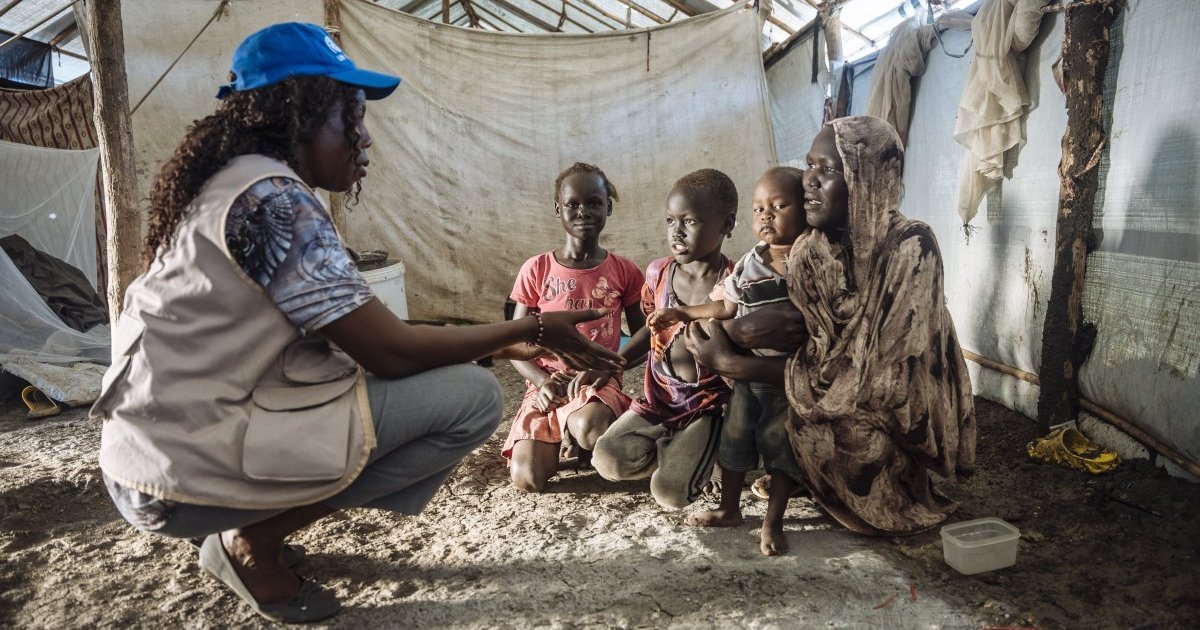
Geneva/Juba, 20 June 2025 – The International Organization for Migration (IOM) is deeply alarmed by the suspension of its life-saving transport services for thousands of displaced people in South Sudan due to critical funding shortfalls. With humanitarian needs on the rise and more people fleeing violence in neighbouring Sudan, IOM is urgently appealing for USD 6.5 million to resume this vital support and prevent vulnerable people from being left stranded.
“The people arriving in South Sudan have already endured unimaginable trauma – conflict, displacement, and profound loss,” said IOM Director General Amy Pope. “It is unconscionable that, after surviving so much, they are now left stranded at the border without the means to reach safety or rebuild their lives. We cannot allow financial constraints to determine whether people live with dignity or languish in desperation. The time to act is now. This lifeline must be restored – urgently.”
Onward transport assistance (OTA) is a critical lifeline for those undertaking long and dangerous journeys as a result of the war in Sudan. It allows people to move safely and with dignity from border entry points to their destinations of choice within South Sudan, where they can reconnect with their families, find protection, and access services and opportunities for recovery.
Following the depletion of available funding, OTA operations were drastically reduced and temporarily suspended on 1 June 2025. This suspension has put further strain on host communities, increased the risk of tensions and disease outbreaks, and limited access to already scarce resources such as water, health services, land, and livelihoods. Currently, only one bus and one truck are departing daily from the Joda border to Renk – far below what is needed to meet the scale of the emergency.
IOM operates OTA through a multi-modal transport network, using barges, buses, and aircraft, depending on the security and accessibility of specific routes. Travel from border areas like Renk to destinations such as Wau, Juba, or Bentiu can take more than five days.
Since May 2023, IOM has supported over 570,000 new arrivals in South Sudan with transportation from entry points to transit centers, and more than 250,000 people to their final destination. The need for this service is now greater than ever as people continue to flee Sudan’s warzone and arrive in South Sudan’s fragile northern regions.
As the crisis continues, population movements are shifting, with new waves of arrivals from other areas placing additional strain on already overstretched border communities and services. These new arrivals are compounding South Sudan’s already dire humanitarian crisis, marked by years of conflict, disease outbreaks, and climate shocks.
Since the outbreak of conflict in Sudan in April 2023, nearly 1.2 million people have crossed into South Sudan, which continues to maintain an open-door policy for those fleeing violence. Of these arrivals, 32 per cent have been identified as Sudanese refugees and 68 per cent are South Sudanese returnees.
Thousands continue to cross into South Sudan each week. However, since April 2025, approximately 85,000 people have crossed from South Sudan into Sudan. This includes South Sudanese refugees and Sudanese nationals returning home, primarily due to insecurity and the lack of essential services in South Sudan.
Many of those arriving at border areas like Renk are exhausted, malnourished, and without the financial or physical means to continue their journeys. They face urgent medical needs or serious protection risks, including unaccompanied or separated children, older people, persons with disabilities, and those requiring referral to specialized care.
With 125,000 new arrivals expected between July and the end of the year and 43,000 people in urgent need of transport assistance, IOM warns that the crisis will only deepen in the absence of immediate funding. IOM calls on donors and partners to urgently step in and restore this critical service, ensuring safe, dignified onward movement for those fleeing conflict and seeking protection in South Sudan.
For more information, please visit IOM’s Media Centre.
Please visit:
Our Sponsor
